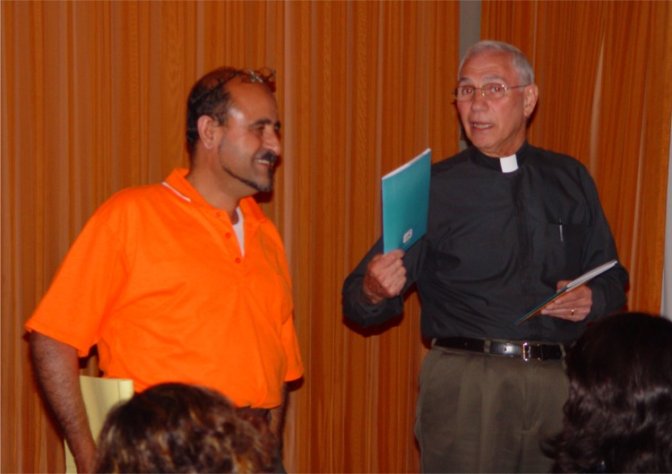Home > Oasis of Peace > Projects & Outreach > Doumia-Sakinah: The Pluralistic Spiritual Centre > Palestinian liberation theology as a tool for peace education
Palestinian liberation theology as a tool for peace education
Tuesday 17 May 2005
All the versions of this article: [English] [עברית]

As part of our series "Culture, Society & Tradition: a critical view" we invited Rev. Dr. Naim Ateek to speak on "Palestinian liberation theology as a tool for peace education". Rev. Ateek was born in the town of Bisan (Beit Sha’an) and was educated in Nazareth, pursuing his academic studies in the United States. He has served in the Anglican church in the Galilee and Jerusalem and, in 1989, he established the Sabeel Ecumenical Liberation Theology Centre in Jerusalem. His book, Justice and Only Justice: A Palestinian Theology of Liberation has appeared in several languages.
Sabeel is a Palestinian Christian ecumenical grassroots movement for liberation. It is an ecumenical centre tor Palestinian liberation theology that tries to find contemporary relevance in the words of the gospel. Sabeel in Arabic means both a way and a water source. The organization hopes to develop a spirituality based on justice, peace, nonviolence, liberation, and reconciliation between people of differing faiths and nationalities. Sabeel also works to advance a correct awareness of the identity and presence of Christian Palestinians.
Rev. Ateek opened his presentation with an introduction to Liberation theology as practiced in South America. The movement sprang out of the observation that popular religion often tended to maintain the socio-economic order, and that in many cases, clergymen take the side of the established regime rather than the common people who are oppressed by it. One bishop said, "when I help the poor they say I am a saint – when I speak on their behalf they call me a communist". Certain clergymen thought that it may be possible for religion to be, conversely, a support in the struggle for liberation, especially in the economic field. In many places where there are oppression, racism, and conservatism some clergymen began to act for the liberation instead of remaining silent.
Whereas, throughout history, clergymen have tended to urge the poor to accept their lot, rather than protest against it, new currents were seen. In the 1970s and ’’80, there was a development of liberation theology among Afro-Americans, together with the development of concepts for women’s liberation. The movement spread to many other areas of oppression in Africa and Asia. "In a humble way", said Ateek, "I am trying to develop here a Palestinian liberation theology".
Like any liberation theology, he said, we must begin by analyzing the given situation. Palestinian society is considered, the position of the church in this regard, and to what extent it plays a role in what happens. Another matter to be studied is the possibility for peace and reconciliation. In this way, theology has to considers every significant matter that influences the life of Palestinians.
"We begin with basic questions such as whether God exists? Who is he, what is our concept of him - and what is the connection between God and mankind." If we regard God as a father who loves everyone equally, then, as soon as we find inequality, we are faced with a dilemma. If we believe that God is just, the injustice and oppression that we see must be against God’s will. This is the basis of Palestinian theology.
When I came to deal with Palestinian theology, I stood before a number of challenges. First, the concept of God among Palestinian society, not only Christian society; second, the way in which the Christian world in the West regards us. For instance, we must deal with Christian groups, mainly in the USA, who call themselves "Christian Zionists". It was important to understand their concepts in order to oppose them. The basic subject is reading of the texts. Rev. Ateek remarks that he does not believe in reading the texts in a literal way but in the necessity for interpretation.
Christian scriptures are based on the old and new testaments. The challenge is in how to interpret the text and the need to understand that Jews and Christians interpret the same texts differently. For instance, if we take the text literally, then we may conclude that the holy land belongs only to Jews.
On the other hand, there are texts, particularly those that followed the Babylonian exile, that show a more universal approach. The big development, in Rev. Ateek’s opinion, was the transition from a tribal to a more universal concept of God, (where God was seen as belonging to and caring for all of humankind). This understanding of God’s universality leads Rev. Ateek to conclude that "the promised land" cannot have been meant only for Jews.
Christian Palestinian liberation theology also takes inspiration from the life of Jesus as a "Saviour who taught and died under occupation." In Rev. Ateek’s opinion, his story can teach the ways of resistance to occupation, which, in the same way, should be nonviolent. "The Sabeel Centre therefore calls for nonviolent resistance and, at the same time, speaks out against violent resistance to the occupation".
Rev. Ateek brought with him several booklets published by Sabeel, among them:
– "A call for moral and responsible investment", in which there is a call to churches around the world to invest in support of nonviolent resistance to occupation, with the aim of arriving at a just solution to the Israeli - Palestinian conflict.
– "Suicide Bombers - the theological and moral problem of suicide bombings. A Palestinian Christian perspective."



